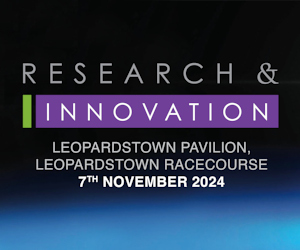Decarbonisation Will Involve Most Profound Social Transformation Since the Industrial Revolution

Decarbonisation will involve the most profound social adjustments and transformations since the Industrial Revolution. That’s according to Professor Murray Hitzman, Director of iCRAG the SFI Research Centre for Applied Geosciences at the iCRAG2019 conference – Resources for a Sustainable Future – which was held recently in Dublin.
In his opening address, Prof Hitzman said: “Achieving the decarbonisation we know scientifically is needed is a huge undertaking and will require fundamental changes in how societies operate and make decisions. It will likely involve the most profound social adjustments and transformations since the Industrial Revolution. The Industrial Revolution in Europe lasted two or three generations. We must make radical changes by 2050 – in just one generation.
“While it is not just one country’s challenge, in Ireland, iCRAG’s team of geoscientists, engineers and social scientists is working together to provide resources and solutions for a sustainable future under three grand challenges: Earth Resources, Earth System Change, and Earth Science in Society. We are committed to driving research and discovery, not just for today, but for future generations.”
The conference brought together 250 members of the academic geoscience community as well as industry and government to deliver insights into future directions for Irish geoscience research and how the geoscience research sector can play a leading role in addressing the Climate Action Plan and Ireland’s commitments to the UN Sustainable Development Goals.
Speaking about how geoscience can help create a positive climate future, Professor Mark Ferguson, Director General, Science Foundation Ireland and Chief Scientific Adviser to the Government of Ireland, said: “Geoscience underpins many of the changes that our society must make in the coming decades. The metals and minerals needed to create renewable technologies and batteries, the energy sources required for the green transition, and the management of water resources in a changing climate, all rely on geoscientific expertise. Through its targeted research programme, the iCRAG SFI Research Centre is well positioned to deliver economic and societal impact for Ireland across many areas of natural resources.”
Keynote speakers at the iCRAG 2019: Resources for a Sustainable Future conference included Dr Elizabeth Eide, Director of Board on Earth Sciences and Resources and Water Science and Technology Board at the U.S. National Academy of Sciences. In her address, Dr. Eide highlighted how human activities have had direct effects on natural Earth processes and have influenced dramatic Earth change on timescales that matter for people.
She said: “The planet on which we live is undergoing change every day due to an intricate combination of natural processes and human interactions. Geoscience research contributes to understanding and predicting this change. Increased understanding allows for better decision-making, resource stewardship, environmental sustainability, economic growth, and the health and security of communities. Research Centres like iCRAG support geoscience research that can lead to this kind of increased understanding.”







